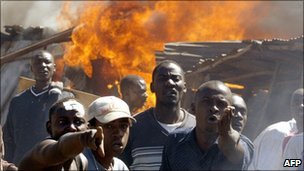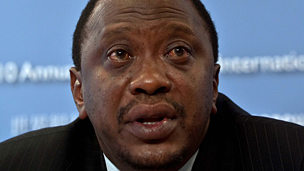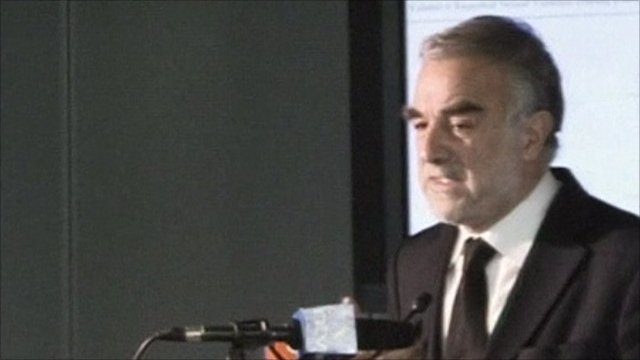Rutashubanyuma
JF-Expert Member
- Sep 24, 2010
- 219,470
- 911,173
OCAMPO HITS THE LOWEST NOTES ON KENYAN VIOLENCE…
You may be familiar with the Kenyan violence unleashed on innocent blood following the announcement of the controversial verdict of presidential election. Under USA auspices, ex-UN boss Kofi Annan parched up a coalition government headed by Mwai Kibaki and his rival Raila Odinga.
Those two principals were charged with the onus of overseeing impunity is brought to a screeching halt leading to a formation of Waki commission. This process was, however, flawed abinitio. It was tantamount of entreating an African Chief to rip off his own manhood for surmises of crimes leveled against him. However, Justice Phillip Waki himself was a subject of criminal investigations ensuing from president Kibaki's formation of a judicial tribunal.
Justice Waki was cleared but his hands were already soiled. One needs to query whether Justice Waki was the right "Lord" to chaperon such a sensitive political commission.
Uhuru Kenyatta's line of defense against his inclusion in the Waki's infamous list of the suspects aimed to indicate that the Waki commission never availed him the opportunity of being heard. Similar line of defense was pursued by William Ruto, both now at the centre of ICC indictments instigated by the Chief prosecutor at ICC. In both cases the constitutional court rejected those pleas on flimsy grounds that Waki was not issuing a verdict but he was merely raising allegations which will be sorted out during actual trials.
These should have been warning shots for Ocampo that Kenyan courts were neither intimidated nor under the pockets of the duos, and hence Kenyan judicial system should not have been interrupted by the ICC whose mandate is constrained to failed judicial systems, of which Kenya is not. Yet Ocampo did not read these telltales, and accepted the Waki list handed over to him by Mr. Annan. Ocampo is on record denying the Waki report had anything to do with his findings, but is this not a case of closing the stable after the horses had left?
For Ocampo his indictments are an epitome of double speak…………..on one hand he is dicey about issuing indictments against the main beneficiaries of the violence that is Mr. Kibaki and Raila on vexatious and frivolous scapegoats of lacking evidence. But by indicting their closest allies, Mr. Ocampo is directly or otherwise incriminating the two principals of being behind the juggernaut contretemps.
But there is another serious mischief from Ocampo which needs further exposure………By naming the six suspects Ocampo is making a case of judicial system in Kenya has collapsed beyond repair, and yet he is refusing to apportion the criminal negligence blame on the two principals!!!!!!!!! I find that kind of doublespeak quite intolerable………………
Ocampo must not be allowed to eat his cake and still claim he still has it………..Either the judicial system in Kenya is working and the ICC should allow it to sort out the legal imbroglio or the system has been put kibosh by the two principals, and it is them who should carry the can for their connivances not their able paws……………
In this case, it is the ICC but not the six suspects who are in the dock…….will the ICC reminisce upon her main objectives or will it be swallowed by the urge of sensationalizing the prosecution weak case and permit it to disgrace the ICC's integrity?
You may be familiar with the Kenyan violence unleashed on innocent blood following the announcement of the controversial verdict of presidential election. Under USA auspices, ex-UN boss Kofi Annan parched up a coalition government headed by Mwai Kibaki and his rival Raila Odinga.
Those two principals were charged with the onus of overseeing impunity is brought to a screeching halt leading to a formation of Waki commission. This process was, however, flawed abinitio. It was tantamount of entreating an African Chief to rip off his own manhood for surmises of crimes leveled against him. However, Justice Phillip Waki himself was a subject of criminal investigations ensuing from president Kibaki's formation of a judicial tribunal.
Justice Waki was cleared but his hands were already soiled. One needs to query whether Justice Waki was the right "Lord" to chaperon such a sensitive political commission.
Uhuru Kenyatta's line of defense against his inclusion in the Waki's infamous list of the suspects aimed to indicate that the Waki commission never availed him the opportunity of being heard. Similar line of defense was pursued by William Ruto, both now at the centre of ICC indictments instigated by the Chief prosecutor at ICC. In both cases the constitutional court rejected those pleas on flimsy grounds that Waki was not issuing a verdict but he was merely raising allegations which will be sorted out during actual trials.
These should have been warning shots for Ocampo that Kenyan courts were neither intimidated nor under the pockets of the duos, and hence Kenyan judicial system should not have been interrupted by the ICC whose mandate is constrained to failed judicial systems, of which Kenya is not. Yet Ocampo did not read these telltales, and accepted the Waki list handed over to him by Mr. Annan. Ocampo is on record denying the Waki report had anything to do with his findings, but is this not a case of closing the stable after the horses had left?
For Ocampo his indictments are an epitome of double speak…………..on one hand he is dicey about issuing indictments against the main beneficiaries of the violence that is Mr. Kibaki and Raila on vexatious and frivolous scapegoats of lacking evidence. But by indicting their closest allies, Mr. Ocampo is directly or otherwise incriminating the two principals of being behind the juggernaut contretemps.
But there is another serious mischief from Ocampo which needs further exposure………By naming the six suspects Ocampo is making a case of judicial system in Kenya has collapsed beyond repair, and yet he is refusing to apportion the criminal negligence blame on the two principals!!!!!!!!! I find that kind of doublespeak quite intolerable………………
Ocampo must not be allowed to eat his cake and still claim he still has it………..Either the judicial system in Kenya is working and the ICC should allow it to sort out the legal imbroglio or the system has been put kibosh by the two principals, and it is them who should carry the can for their connivances not their able paws……………
In this case, it is the ICC but not the six suspects who are in the dock…….will the ICC reminisce upon her main objectives or will it be swallowed by the urge of sensationalizing the prosecution weak case and permit it to disgrace the ICC's integrity?



 It's the beginning of the end of impunity
It's the beginning of the end of impunity
 ICC preparations
ICC preparations